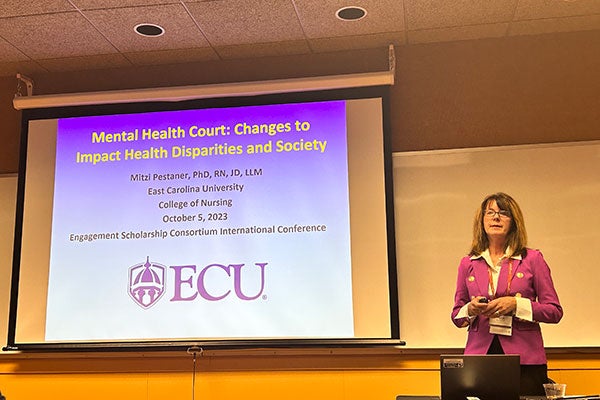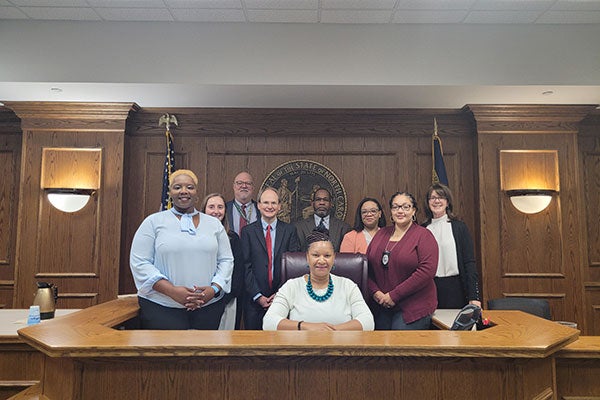Lawyer Nurse
Nursing professor and lawyer makes impact on Pitt County courts
Dr. Mitzi Pestaner, an assistant professor in the College of Nursing’s baccalaureate education department, took the long way to get to exactly where she needed to be – making the community she has grown to love a better place.

Dr. Mitzi Pestaner discusses her role on the Pitt County Behavioral Health Treatment Court at a recent conference. (Contributed photo)
Pestaner is from Burlington, North Carolina, several hours west of Greenville. She moved to Cecil County, Maryland after high school, a rural pocket of the state bookended by the bustle of Baltimore and Wilmington, Delaware, and took community college courses to get a foot in the door of the nursing profession.
Working long hours as a new nurse, she traveled to the University of Maryland, Baltimore to get her bachelor of science in nursing because she knew behavioral health nursing was where she wanted to apply her efforts
Baltimore is where she saw how desperately the nation needs access to behavioral health care.
“It was incredible. There was a lot of heroin use, inner city things that I wasn’t accustomed to, so it was really a culture shock for me. The psychiatric illness is severe, and you have the substance use disorder and the violence,” Pestaner said. “It was really an incredible learning experience for me.”
Pestaner spent several years working for a Baltimore-area psychiatric outpatient service, which fed her need to help. She recalls one patient who exemplified the success that one-on-one counseling can achieve. A 19-year-old community college student started behaving oddly – hiding knives and covering mirrors in his house – which prompted his mother to reach out for help. Pestaner made house calls. The young man sat on the front porch, stone-faced and mumbling to himself during her visit.
After several weeks he relented, saw a psychiatrist and allowed Pestaner to give him a first injection of anti-psychotic medicine.
And then he smiled. A tiny crack of a smile, but a smile.
“This is why I love this kind of nursing. Psychiatric illnesses are tough,” Pestaner said.
From nurse to lawyer

Dr. Mitzi Pestaner (right) with members of the Pitt County Behavioral Health Treatment Court team. Seated in the middle is Judge Wendy Hazelton. (Contributed photo)
While working as a psychiatric nurse, Pestaner said something felt missing – she needed more in her life. A single mother, working full time as a nurse, she made the difficult decision to spend four nights a week driving to Baltimore to tackle law school classwork. After graduation and passing the bar exam she remarried and moved with her new family to California where her husband worked as a forensic pathologist.
Pestaner is licensed to practice law in both North Carolina and Maryland, states she says share similar legal philosophies and norms, but taking the bar in California is another matter so she worked for as a bodily injury claims adjustor for a major insurance company.
“I handled injury claims. Being a nurse was helpful, but they liked the law part, too,” Pestaner said.
Her family was constantly on the move. For years they pinged across the country for work – from the west coast to the east coast – finally settling in Greenville, where Pestaner said she felt very much at home.
And where she could practice law again.
“I took court appointed cases, I was the child support attorney for Pitt County government. That’s got to be one of the hardest jobs I’ve ever had because you’d have 100 cases on a docket and the judge would want you to get them in and get them out,” Pestaner said. “The judges have a difficult job with high caseloads and the people you’re defending are never really happy because they don’t get the child support that they would like to get.”
Working with court appointed clients she really began to see the link between people with legal entanglements and mental illness After moving to New York in 2018, she went back to school and got a doctorate in nursing from ECU, taking another step on a path to building an arsenal of skills she would put to use after returning to Pitt County.
Pestaner made the move to be a full-time faculty member at the CON in January of 2021, an unsettled time due to the COVID-19 pandemic – a job that she didn’t know was perfectly suited for her.
“It never occurred to me how much I love school. I have a masters in tax law, a law degree and I enjoyed the PhD program so much,” Pestaner said. “I’ve gotten so much satisfaction teaching the undergraduate nursing students – they’re just so enthusiastic and I’m very impressed with their professionalism.”
The teaching filled a void but she wanted to do more.
Partnering with Behavioral Health Treatment Court
The Pitt County Behavioral Health Treatment Court, the newest of eight in the state, held its first session in July 2020, and since has graduated individuals through the process of treatment, counseling and community integration.
Offenders who are accepted by the court agree to a year-long process of court appearances; reporting on their medical and treatment compliance; their housing and employment situations; and updates to the judge on the conditions of any parole or probation requirements. Pestaner said the BHTC works because it keeps people who commit less serious crimes because of mental health or drug dependance from falling down a well of recidivism and exacerbation of their mental health conditions.
Pestaner knew that working with the BHTC was a great fit because of her training and education, and her desire to see positive change in eastern North Carolina made her the right person for the job.
“It’s law, it’s mental health. It’s a perfect merging of my interests and a perfect partner for me in the community. What better thing to do than to help your community be safe?” Pestaner said.
Pitt County Judge Wendy S. Hazelton runs the BHTC and has partnered with Pestaner in the courtroom and in advancing the normalization of alternative paths of treatment and justice for low-level offenders with substance use and mental health problems. They partnered to write an article about the BHTC for the North Carolina Bar Association’s professional journal, which outlined the court’s procedures.
“Our aim is to take in individuals who have mental health concerns or diagnoses and when they have found themselves involved in the criminal justice system, we are able to address those mental health concerns, to get them on track with treatment,” Hazelton said.
Pestaner laments the evolution of health care from systems more concerned with the bottom line than consideration of human consideration and concern.
“The one-to-one interactions I really enjoy. Unfortunately, psychiatric nursing has evolved a lot and engagement is missing because medicine is such a business now – get them in for a three-to-five-day length of stay, stabilized and then back out,” Pestaner said.
“I bet if you were to go into an inpatient unit today one of the complaints you would probably hear from patients is ‘Nobody sits and talks to me,’” Pestaner said.
One of her current research interests relates to the therapeutic jurisprudence that the BHTC brings into marginalized communities. Pestaner said there is growing evidence of social disconnectedness among black adolescents, which she thinks might account for the disproportionate rise in attempted suicide rates in black children and teens.
“If you get into the literature, depressive symptoms may display themselves differently among black youth. There may be aggressive behavior, which may be misperceived as acting out, which leads to higher rates of suspensions and expulsions, which is also a risk factor for suicide,” Pestaner said.
ECU values the work Pestaner is doing to support the local legal system and provided a grant to help fund some of her outreach work with the court. She has worked to publicize the program with flyers and through personal outreach with the district attorney’s office, the sheriff’s department and public defenders. She has also conducted mental health first aid training sessions for Pitt County Bar Association members and hopes to expand that training state-wide as an approved formal training requirement opportunity for members of the North Carolina bar.
“Public defenders particularly represent a lot of indigent people with a mental illness. The Rules of Professional Conduct require that attorneys be able to have reasonable communications with their clients,” Pestaner said.
But if a lawyer is unaware that their client is suffering through a mental health challenge, and that a resource like the BHTC is available, Pestaner said, the likelihood that they will benefit from the court’s unique structure to help those with mental health and addiction issues navigate the legal system is practically zero.
Despite Pestaner’s legal and medical training, it’s the personal connections that continue to be the most impactful for her. In the fall semester of 2022, in one of her large classes of more than 100 students, one young woman was withdrawn. Something just wasn’t right with her. Pestaner said she quietly spoke with the student to simply ask if she was alright – a simple gesture from a psychiatric nurse, teacher and mother.
“At the end of the semester she told me that made her day because she was really going through something,” Pestaner said. “I hope I’m approachable to students so they know they can come to me if there’s a problem and make the classroom a safe and inviting place so they can ask questions. If they get the wrong answer, it’s OK – if they tried, that’s what counts, and we’ll help them to get to the right answer.”
Whether in the classroom or out in the community, Pestaner has proven the value of her dual professional personalities.
“Mitzi has been absolutely awesome. She jumped right in, no questions asked whatever we needed her to do, she was on it. She’s written articles for us, she’s on the grant writing team. Anything we want her to do, she’s on it,” Hazelton said. “This program would not be where it is without her. She definitely has a heart for this community.”
